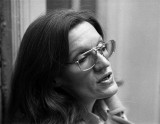I came to Heresies fresh from a sex-discrimination lawsuit brought against our employer by a group of women at Time, Inc., and as a negotiating committee member during the Newspaper Guild strike against the corporation with conventional labor-management issues at stake. These events, along with being active in politics, especially the anti-Vietnam War movement, and a general striving for change (which sounds strangely contemporary, doesn’t it?) engaged me. When a co-worker told me about a group of women artists who were organizing a publication that would explore and develop feminist thought, particularly its relation to art, I was interested, very interested. (My colleague’s then-wife, Hayden Herrera, found her graduate research and a book on Frida Kahlo too demanding at the time for her to actively participate in Heresies.)
Through the group, I was introduced to mid-70s Soho culture, quite different from the midtown, more “conventional” one I’d been part of. The vitality and passion of Heresies’ members was thrilling and challenging, and I was happy to participate in this important part of change – a revolution, it seemed – that was in the air. The dark and mostly deserted streets at night and A.I.R. signs on loft buildings didn’t begin to suggest the energy that fueled our long hours of meetings in the vast spaces inside.
This involvement with the remarkable women and the exhilarating, frustrating problems of the collective were an education, an opportunity for work experiences different from those I’d had before. My undergraduate BFA was in Theatre, a collaborative yet individually defined art form; my work at Time magazine was another kind of collaboration, one in which there was a male-dominated hierarchy. Heresies was so different: feminist, creative, questioning, argumentative, egalitarian. Idealistic. Irresistible.
Working on THREE? Issues with three different editorial collectives, along with helping out where I could on other day-to-day Heresies business, was intense and involving. It changed me, developed and clarified my thinking about all sorts of things that have to do with life, society, women, work and art. I left Time, but eventually returned to journalism at CBS documentaries and a public broadcasting production group, and at last, made a complete change by going to Bank Street College to earn my Master’s degree in Special Education. For the rest of my formal working career, I taught children, mostly severely emotionally disturbed ones, in New York City and the suburbs. Now I teach English as a Second Language and Adult Literacy and tutor private students.
Heresies, it’s gratifying to see, lives on. And how! Seeing announcements of Heresies artists’ shows, the shows themselves, the curators, writers and educators presenting women’s work, will always bring me pleasure. I’m so glad to have had a connection with them all: I’ve missed it. The conversations go on, the changes continue, the memories of that galvanizing time more than 30 years ago – they really do resound.
When there was a reunion some years ago, I looked forward to seeing everyone again, and when at the last moment I couldn’t go, I felt a sense of loss. The Web site and film that Joan created are invaluable for dozens of reasons. Feeling that loss a little less is only one of them.
